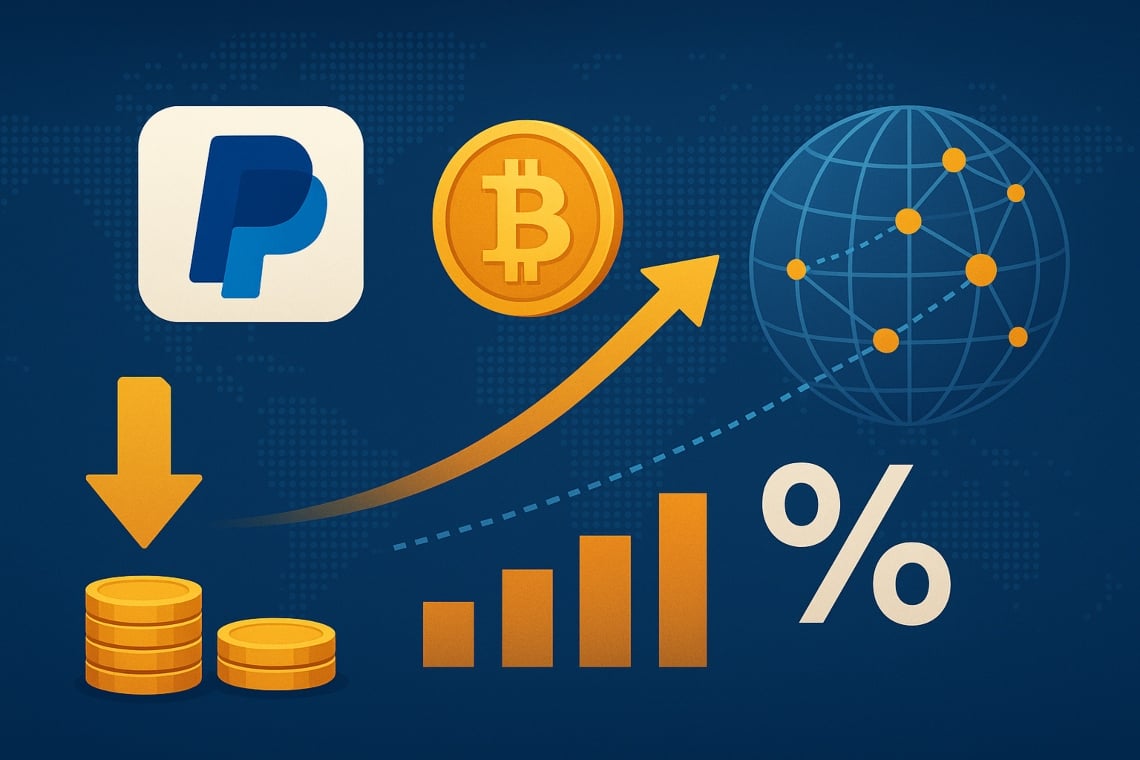PayPal lowers the fees on crypto payments

PayPal decisively enters the payments crypto, market with a model that promises significant savings on fees compared to traditional banking systems, although not up to 90% as sometimes reported.
PayPal’s fees for international transactions can vary, averaging around 0.99% for cryptocurrency transfers, compared to cross-border bank fees that can range between 2% and 4% depending on the country and service.
In the new global scenario, the transfer of digital money becomes faster and more accessible, representing an opportunity for companies, freelancers, and private users.
How PayPal simplifies international crypto payments by lowering fees
Through the Pay with Crypto function, the platform enables fast transactions primarily on some of the most popular cryptocurrencies, even though it does not directly support over 100 cryptocurrencies, but rather a smaller number, including Bitcoin (BTC), Ethereum (ETH), Litecoin (LTC), Bitcoin Cash (BCH), and USD Coin (USDC).
This solution allows the exchange of values between companies and customers, with the automatic conversion of cryptocurrencies into fiat currencies at the time of payment, reducing time, risks, and conversion expenses.
The fees on crypto transactions are around 0.99% according to the current PayPal rates, while an average bank fee for cross-border payments is between 2% and 4%, not between 3%-8%.
The adoption of crypto payments offers numerous benefits for both companies and freelancers:
- Cost cutting: Reduced fees, more sustainable even for micropayments.
- Shortening of times: Almost instantaneous credits, essential for optimizing production chains, freelancers, and suppliers.
- New markets: Access to a digital and decentralized global clientele.
- Simplicity of integration: Possibility to connect digital wallets and platforms with a few steps.
The PayPal platform supports integration with some external wallets like MetaMask, Phantom, and Ledger, but it does not directly support all the wallets mentioned like Coinbase, OKX, Binance, Kraken, Exodus for direct connection to PayPal transactions.
These can operate indirectly through supported exchanges or interfaces. This increases the security and traceability of transactions thanks to blockchain protocols.
PayPal supports stablecoin such as PYUSD (PayPal USD), USDC, and USDT. The stablecoin PYUSD, issued by PayPal, was launched in 2023 and subsequently integrated into payments, including on the Solana blockchain and in development on Ethereum Layer 2 (Arbitrum).
Thanks to the agreement with Fiserv, PayPal allows the use of stablecoin in new markets for fast and stable payments even for large amounts.
The impact on traders and the role of SMEs
The Pay with Crypto function allows merchants to accept payments in cryptocurrencies, fostering loyalty among digitally advanced customers.
Some offers include reward programs linked to the holding of stablecoins like PYUSD. SMEs can operate more easily on an international level, reducing the burden of lengthy processes and banking costs while enhancing financial inclusion.
- Simplified management of international payments and collections
- Facilitation of freelance-supplier relationships thanks to rapid payments and low commissions
- Possibility of generating additional liquidity through held crypto
PayPal supports a limited number of cryptocurrencies, including: Bitcoin (BTC), Ethereum (ETH), Litecoin (LTC), Bitcoin Cash (BCH), USD Coin (USDC).
They are not over 100 as originally indicated, but they cover a good portion of the crypto market capitalization used in payment practices.
The expansion of crypto and stablecoin technologies is promoting a progressive democratization of international payments, particularly useful for those who have difficulty accessing traditional banking systems or face long waiting times.
The PayPal experience represents an important benchmark: if the disintermediation of crypto establishes itself, it could lead to a significant reduction in costs and a more competitive and inclusive scenario for all economic players.
Has the future of cryptocurrencies in payments already begun? Companies and freelancers must seize this opportunity to avoid losing ground in the global financial digitalization.
